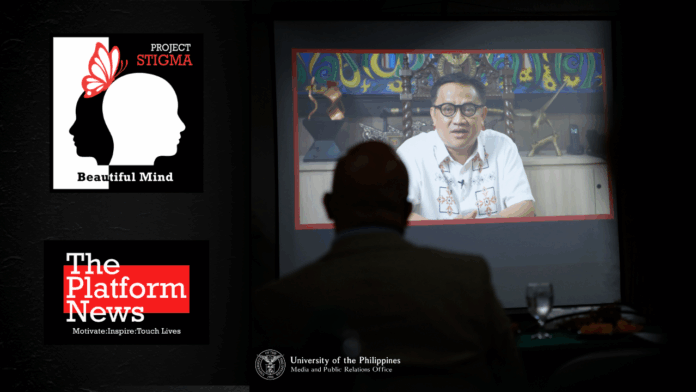The Platform News recognizes the importance of mental health initiatives in the academe. This is the main reason why, in partnership with the Office of the Vice President for Academic Affairs and the Office of Student Development Services (OVPAA-OSDS) of the University of the Philippines, TPN officially launched Project Stigma, a mental health education and advocacy campaign.
The event was attended by students from the University of the Philippines Diliman, mental health advocates, stakeholders, and mental health professionals from both the private and public sectors.
The importance of breaking the stigma and focusing on mental health within the UP system was emphasized when University of the Philippines President Angelo A. Jimenez delivered his message of support and described Project Stigma as an initiative that is not only timely but also vital.
Jimenez added that it serves as the starting point for important conversations about mental health, noting that the issue continues to be one of the most misunderstood, feared, and stigmatized aspects of society both locally and globally.
He also spoke about the Filipino culture of silence, where problems are kept private, and highlighted the prevalent generational gap where older Filipinos often dismiss the seriousness of mental health conditions, while younger people are more aware and open to discussing them.
Jiminez then contrasted these realities with the values deeply rooted in Filipino culture, such as pakikisama, paggalang, and pagpapahalaga sa pamilya, that reflect a strong sense of cultural belonging, respect, and mutual care within communities.
These cultural traits are the foundation of Project Stigma’s approach, which combines traditional Filipino values with modern, research-based educational strategies to strengthen understanding between generations.
While he described this as a “Filipino approach to a Filipino reality,” Jimenez emphasized that as the national university, UP has a mission to research, to learn, and to serve. He stated that worsening mental health conditions in the country can no longer be ignored.
Based on what the university has learned from its community, there is now a clear need to integrate mental health into education, public health, social justice, and human development.
He said that Project Stigma is not only about creating awareness but also about breaking the stigma, shaping policy discussions, and laying the groundwork for long-term change. According to him, the campaign is not just building awareness but also helping to create a new culture focused on mental wellness.
Jimenez ended his message with a powerful reminder: “We will not break the stigma with noise, but with truth, with science, with community, and with love.”



